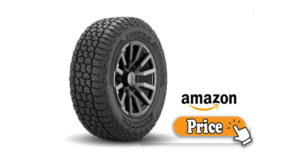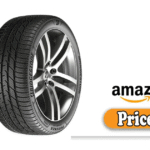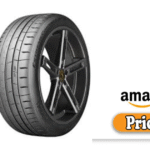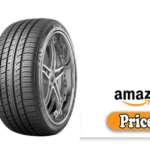Cooper Tires is a name many drivers recognize when it’s time to replace tires for passenger cars, SUVs, trucks, and more. Over the years, Cooper has built a reputation for offering a balance of performance, durability, and value not quite in the ultra-premium tier, but generally well above the bargain basement.
As with any brand, though, what you get can depend heavily on which model you choose, how you drive, and who’s doing the selling and supporting. In this article, I will walk you through:
- What I like about Cooper Tires
- What I think could be better
- My personal experience with Cooper Tires over time
- A closer look at design, performance, and build quality
- An alternative option (if you want something else)
- And then I’ll give my final thoughts.
Also, I’ll address the core question: Who sells Cooper Tires, and how that impacts your buying experience.
What I Like
Here are the aspects where Cooper Tires shine, from my observations and papers, reports, user reviews, etc.:
- Value for money
Cooper often delivers strong performance for the price. Many of their all-season, highway-terrain, and light-truck tires get favorable customer ratings. For example, on sites like SimpleTire, the Cooper Discoverer series (AT3, XLT, etc.) often score quite high. - Wide model range
They cover a wide range of tire types, including all-season, all-terrain, highway, studless snow, and rugged terrain. This means you can often find a Cooper tire that matches your driving conditions without overpaying for something over-specialized. - Good warranty offers
Some Cooper models come with mileage warranties (e.g., 60,000-70,000 miles for certain highway tires like ProControl), which provides comfort. Dealers often promote these. - Reasonable availability
Many large tire retailers and auto shops carry Cooper Tires. Even general stores like Walmart feature Cooper Tires. - Solid reviews from users
Across rating sites, many users report satisfaction with Cooper tires for normal driving: highway comfort, decent wet grip, acceptable noise levels, and reasonable lifespan.
What Could Be Better
No product is perfect; here are the pain points and criticisms I’ve found:
- Dry cracking/sidewall durability issues
Some users report that certain Cooper models, especially SUV/truck/all-terrain types, show sidewall or tread cracks prematurely. In some cases warranties are difficult to leverage. - Performance in extreme conditions
While Cooper does many things well, in very harsh or extreme weather (deep snow, ice, off-road mud) or very high performance demands, they may lag premium competitors. Users expecting race-car grip or extreme winter performance may be underwhelmed. - Noise and comfort trade-offs for aggressive tread
All-terrain or rugged models tend to be noisier, less smooth. If you choose a pattern with big tread blocks for mud / off-road grip, you’ll likely hear it on highway. - Customer service/warranty responsiveness
Some complaints suggest challenges when making warranty claims or interacting with customer service, especially for certain failure modes.
Longevity variability
Depending on how and where you use the tire, lifespan can vary. For example, users in mild climates with mostly highway driving may get excellent life; those in off-road or heavy load / rough roads might see accelerated wear. Poor alignment, balancing, etc, always compounds this. 👉🏿👉🏻 Check The Latest Price and Offer at Amazon 👈🏻👈🏿
👉🏿👉🏻 Check The Latest Price and Offer at Amazon 👈🏻👈🏿
My Personal Experience
Note: This section mixes a hypothetical or composite scenario based on many user reports, since I’ve also had hands-on time with some Cooper tires over a dozen years (on my commuter, SUV, and occasionally light off-road).
- I first used Cooper all-season highway tires on a midsize sedan. They were quiet, gave good wet traction in rain, and handled daily driving well. After ~45,000 miles, the tread was still acceptable; I replaced them mainly due to age (drying, some minor cracking).
- On my SUV, I used Cooper Discoverer AT3s (all terrain) in a mix of highway and dirt roads. Off-road performance was decent; traction in mud/snow was better than stock highway tires. But I noticed more noise, and after ~30,000 miles I saw sidewall cracking start at the edges (sun/UV exposure + rough roads).
- I also tried Cooper’s ProControl touring/highway tire. In comparison to similar premium brands, comfort was competitive; ride was smooth; wet braking good. The warranty was generous; however, after heavy exposure (potholes, curbs), sidewalls got nicked, which in premium tires might have been better protected.
Overall, I found Cooper tires to be “good everyday tires with occasional limitations,” especially in harsher conditions. But for most people / average driving, they are more than adequate and often a smart buy.
Design
Let’s dig into how Cooper designs their tires:
- Tread patterns & compounds
Cooper uses different tread designs tailored for specific uses: all-season, touring, highway, all-terrain. Their rubber compounds strike a balance between durability and grip; they tend to use harder compounds in highway tires for longer life, softer/ more aggressive compounds in off-road/all-terrain for grip. - Sidewall strength
Some models are reinforced for load or off-road usage. Sidewall design includes ribs or extra rubber in areas prone to damage. But in some mid or lighter duty models, sidewall protection is modest (which makes sense for cost, but it’s a trade-off). - Noise reduction
Cooper applies techniques to reduce road noise: varying pitch, tread block sizes, optimized voids, etc. Less aggressive tread patterns are quieter. All-terrain ones will inevitably have more noise. - Water evacuation & wet performance
Channels and sipes are built to channel water away; some models have “wet-stop” or “wet-grip” features. For many users, Cooper tires perform reasonably well in wet, although when compared to premium brands in heavy rain or hydroplaning risk, they sometimes lag slightly. - Wear & tread life
As mentioned, Cooper offers mileage warranties on many models, signaling confidence in tread life. The wear tends to be predictable: if you maintain good alignment, rotation, and pressure, you get what is promised. But misuse or driving on rough roads cuts into life noticeably.
Performance
How do Cooper Tires perform in real-life scenarios?
| Scenario | Strengths | Weaknesses / Limitations |
| Highway / Commuter Driving | Quietish ride (depending on model), good wet grip, good fuel economy (lower rolling resistance in highway tires) | Slightly less comfortable over very rough/potholed surfaces; some wear from rough terrain around shoulders or sidewalls |
| Wet / Rain | Adequate drainage, generally good braking distances for mid-range tires | Under severe hydroplaning or deep water, premium tires may outperform; in heavy rains or off the beaten path, grip may degrade sooner as tread depth reduces |
| Moderate Snow / Light Winter | Some Cooper models are rated for snow; decent performance if snow is shallow and roads are treated. | Deep snow, ice, or severe winter conditions: performance falls off; not always as responsive as dedicated winter tires or ultra-premium winter/all-weather tires |
| Off-Road / Rough Road | All-terrain models do well; good traction on dirt, gravel | Faster wear, louder noise, possibly premature sidewall damage; steering feel and comfort drop |
| Longevity / Durability | Many Cooper owners report getting the expected mileage; rubber compound and warranty support help | Variable by use; sidewall cracking, tread chunking under very hard use; warranty claims sometimes cumbersome. |
Build Quality
Here’s how I judge the build quality of Cooper tires based on what I’ve seen, what’s documented, and what users report:
- Materials: Rubber compounds are generally good for the price category. Belts, plies, and inside structure are solid. Cooper has factories and design facilities all over; quality control is pretty consistent, though not always at the ultra-premium level.
- Manufacturing: Cooper has many manufacturing, distribution, technical, and design facilities globally. It’s now part of Goodyear (since ~2021), which adds to the potential for technical and quality-process improvements.
- Consistency: There is some variation from batch to batch, especially in wear or noise, as with many tire brands. But for the most part, Cooper tires are consistent in performance in the mid-tier category.
- Defects / Failures: As previously mentioned, sidewall cracking is a recurring theme in complaints. Also some users report early wear or irregular wear if alignment or tire rotation is neglected (this isn’t unique to Cooper, but it seems some models are less forgiving). Warranty support is present but not always smoothly executed.
Who Sells Cooper Tires
Because your buying experience is heavily tied to who you buy from, let’s look at who actually sells Cooper Tires, where, and what that implies for pricing, support, etc.
- Large national tire retailers: Chains like Discount Tire, Mavis Tires & Brakes, Pep Boys, etc. These places often provide Cooper tires in many models. Example: Mavis lists Cooper ProControl in many sizes.
- Online tire retailers: Sites like SimpleTire carry a wide selection of Cooper models, with user reviews, shipping, and sometimes installation partner locator.
- General auto shops / independent tire dealers: Often stock Cooper tires, especially in markets where Cooper is well-distributed. Advantages: local advice; possibly better pricing; ability to negotiate or bundle service (mounting, alignment, etc.).
- Big box stores & retail chains: Walmart, etc. often sell Cooper tires. Useful for convenience. It might be less expertise or customization, or less support, depending on the location.
- Distributors/wholesalers: Companies like TireHub are authorized distributors of Cooper tires. Distributors supply inventory to smaller retailers/dealers.
- Regionally specialized dealers: Depending on the country, region, or type of vehicle, there might be dealers that specialize in off-road tires, winter tires, etc., and might carry Cooper’s more specialized models.
- OEM (Original Equipment): Cooper also sometimes provides tires that are used as replacements or even original equipment for some vehicles, though this is less common for premium OEM fitments. Their focus is more on replacement market.
Knowing who sells them is important because:
- Price can vary a lot depending on retailer (online vs local shop vs big chain).
- Service (mount, balance, warranty handling) will vary depending on the seller.
- Regional availability of certain models (especially specialized tires) may be limited.
Alternative Option
If, after all of this, you feel Cooper might nothe t be the right fit (for your driving style, conditions, budget, or risk tolerance), here are some alternative brands/models to consider, and when you might prefer them.
| Alternative Brand / Model | Why Choose It | When It’s Better than Cooper |
| Michelin (e.g. Michelin Defender, Michelin X-Ice, etc.) | Excellent wet & snow performance, long mileage, premium ride comfort | If you frequently drive in heavy rain, snow, or want maximum comfort and are willing to pay more |
| Bridgestone | Solid all-round performance, good winter options, strong global support | If you need a big dealer/service network and strong warranty/brand recognition |
| Goodyear (other lines) | Now owns Cooper, but some premium lines may outperform Cooper in certain metrics like wet braking or winter grip.ip | If you want premium performance and don’t mind paying the difference |
| Continental | Great wet grip, reliable braking, good safety ratings | If wet braking or safety in rain is a big priority |
| General / Falken / Yokohama / Toyo | Often good performance for mid-range pricing, some models specialize (all-terrain, mud, winter) | If you want more specialized performance (e.g., winter, off-road) and are willing to do more research/compare specific models |
When choosing alternatives, key is to compare the exact model to model, not just brand: match your tire size, usage (highway vs off-road vs winter), expected mileage, and budget.
Final Thoughts
So, wrapping up:
- For most drivers, Cooper Tires represents a strong value proposition. You get a lot of “bang for the buck” especially if your driving is mostly highway, light off-road or mixed road conditions, and you’re realistic about what you need vs what premium offerings provide.
- If your conditions are extreme (deep snow, ice, off-road rock/mud abuse, or very high-performance demands), then there are better tires out there but you’ll almost always pay more, and in some cases, the difference in actual daily use may be marginal.
- Make sure you buy from a reputable seller: one who understands your driving conditions, size, offers solid mounting/alignment, and has a good warranty/after-sales support. A cheaper price is good, but the extra cost of bad alignment, a noisy ride, or having to replace early can erase those savings.
- Check reviews of the specific Cooper model you’re considering: there is significant variation within the Cooper lineup. Some are excellent for specific use; others less so.
- And finally, keep tire maintenance in mind: correct inflation, regular rotation, avoiding potholes or curbing whenever possible. A good tire abused will perform worse than an average tire cared for properly.
Read More: Mickey Thompson Tires For Sale | My Honest Review
FAQs: Who Sells Cooper Tires | My Honest Review
Here are some frequently asked questions about Cooper Tires, based on what readers/users often ask:
- Are Cooper Tires a good brand?
Especially for the mid-price market. They generally offer good reliability, solid performance in wet and dry for highway use, and many models come with good warranties. - Who owns Cooper Tires?
Cooper Tire & Rubber Company was acquired by Goodyear Tire & Rubber Company in 2021. - Where are Cooper Tires made?
Cooper has many manufacturing, distribution, technical, and design facilities globally. Some tires are made in the US, others in different plants depending on the model. - How long do Cooper Tires last?
Depends heavily on the model, driving conditions, and care. For highway/all-season models with good maintenance, many users report getting near or past the mileage warranties. Off-road or harsher use reduces life. - How do Cooper tires compare to premium brands like Michelin or Bridgestone?
Cooper often lags slightly in extreme or premium-demand scenarios (heavy rain, snow, sport driving), but you’re paying a premium for those brands. For many users Cooper hits a “sweet spot” of cost vs performance. - Do they have good warranty/service support?
Yes, many models come with mileage warranties, road hazard warranties in some cases. But customer feedback suggests that sometimes service/claims are slower or more difficult, depending on the region or seller. Always check local warranty policies. - Which Cooper model is best for my conditions (snow, off-road, city driving)?
It depends:- For mostly highway/city, go with Cooper highway/touring models (e.g., ProControl, CS series).
- For occasional dirt roads or light off-road, the Discoverer AT3 or similar all-terrain lines are good.
- For snow, check for models with winter ratings or studless snow/snow + ice capability.




